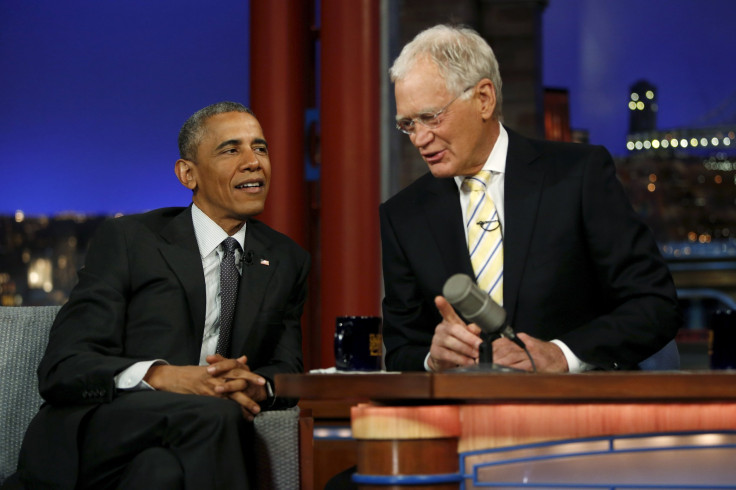David Letterman Subverted Celebrity Culture, Prized Real People

When NBC’s "Late Night With David Letterman" first aired in 1982, television was awash in aspirational TV that celebrated the rich and famous. And while innumerable celebrities have sat in the Letterman hot seat for interviews over the past 32 years, many were terrified because it wasn’t a given he would treat them with kid gloves as his idol Johnny Carson had done. They had good reason: the real stars of both "Late Night with David Letterman" and "Late Show with David Letterman" weren't celebrities at all.
Letterman's inclusion of "real people" in many segments was a rebuke of celebrity worship, if not celebrities themselves, and subverted the traditional talk show ethos. Letterman not only had a soft spot in his heart for "real people," he also understood the element of surprise a person with no media training could inject into a stilted, old-fashioned interview format.
As Robin Leach sent out “champagne wishes and caviar dreams,” to the unwashed masses at home watching segments of “Lifestyles of the Rich and Famous,” alongside their fictionalized versions on "Falcon Crest" (1981 – 1990), "Dynasty" (1981- 1989) , and "Dallas" (1978 – 1991), Letterman featured his audience’s counterparts – regular folks like Biff Henderson, who as Letterman's stage manager since 1980, was a fixture on the show.
Affable, unpretentious and charming, Henderson, often wearing his headset, was sent to be Letterman's correspondent to big events like the "Kentucky Derby" and "The Indianapolis 500." He also starred in "man on the street" skits (pioneered by 50s talk show host Steve Allen) like, "How long can I read over someone's shoulder before they say something?"
Other "regular folk" guests included his mother, Larry Bud Melman, and hilarious weirdo, comedian Chris Elliott. Letterman was careful not to make fun of the them -- it was their unpolished, awkward, goofy and eccentric “realness” he prized.
Rupert Jee, the Hello Deli owner near the Ed Sullivan Theater who was initially a reluctant guest, proved one of Letterman's most endearing -- and enduring -- real people guests.
“I told them straightforward that I can’t handle television well,” Jee told Salon. “I freak out in front of an audience — it scared the crap out of me.” In contrast to the swanning celebrity, the nervous Everyman was relateable. Here, Letterman introduces a skit starring Rupert to the audience by saying, "We send him out to various locations in New York City -- and we just bother people, don't we?"
An expression of ambivalence about his own celebrity, Letterman's privileging of "real people" over celebrities, whom he sometimes seemed to despise, didn't go unnoticed by celebrities.
Cher resisted being a guest on his show for four years before she accepted in 1986 -- perhaps a move Letterman came to regret. In an infamous appearance, arms crossed defensively, Cher explained why she had been reluctant. "Because you're an a------," she said, a statement that no matter how many times Letterman tried to recover from, it was clear it had rattled him. "You're the only person who's ever said that to my face," he told Cher.
But as we seem to have come full circle back to celebrity worship, Letterman's privileging of the Everyman seems subversive upon reexamination, even if his show hasn't been for a while.
Evidence: In the age of the selfie and celebrity sex tape, everyone wants to be famous -- even if it's for "nothing. It's also telling that NBC is reviving "Lifestyles of the Rich and Famous" with Nick Cannon as the host. And talk show host Jimmy Fallon, in stark contrast to Letterman, has been criticized for seeming desperate to be accepted by the celebrity class.
In place of making stars of real people, Fallon lets celebrities star in the goofy skits Letterman once reserved for noncelebs. Perhaps it is his effort to continue with what "Us" Magazine started with its "Stars: They're Just Like Us" feature. Both attempt to humanize celebrities and to collapse the difference between celebrities and everyone else by showing them do mundane things like get parking tickets, buy Frappaccinos from Starbucks -- and do goofy dances with Jimmy Fallon.
Speaking of Letterman's legacy, Don Kaplan of New York Daily News writes,"The most beautiful aspect was Letterman’s ability to make anyone a part of it."
Well, almost everyone. Letterman's been dogged over years with criticism for being sexist -- both as a host, and apparently, as a boss. After he admitted on-air in 2009 that he had an inappropriate sexual relationship with a female staffer, one of the first female writers for his show, Nell Scovell penned a piece for Vanity Fair recounting the hostile, sexually charged atmosphere that was the early days of "Late Night With David Letterman." It was so bad she left her "dream job" after less than a year, the "Late Night" arena no place for female writers, she wrote. (Ironically, comic writer Merrill Markoe, his partner of 10 years and one of the "Late Show's" earliest writers, is credited as one of the main people who helped give the show its voice and character.)
And just on Monday, Letterman shocked fans waiting outside Ed Sullivan Theater when he took a question from a college staffer who asked what advice he'd give to this year's graduates. “Treat a lady like a wh–e, and a wh–e like a lady,” he replied, reports Page Six. It didn't go over well.
Although Letterman's ostensible sexism or discomfort with women as "real people" will not age well, we'll always have "Stupid Pet Tricks." That won't ever get old.
© Copyright IBTimes 2025. All rights reserved.






















